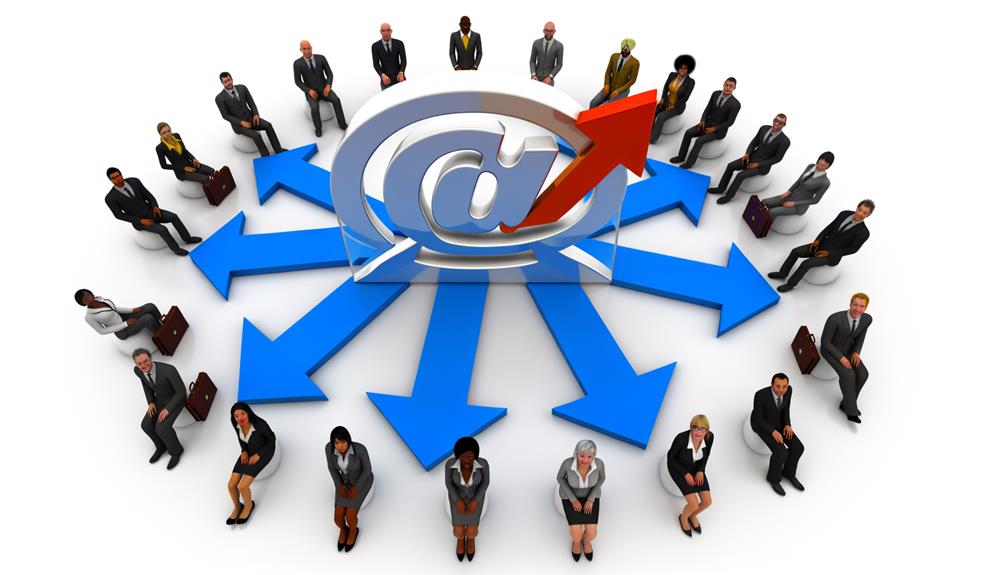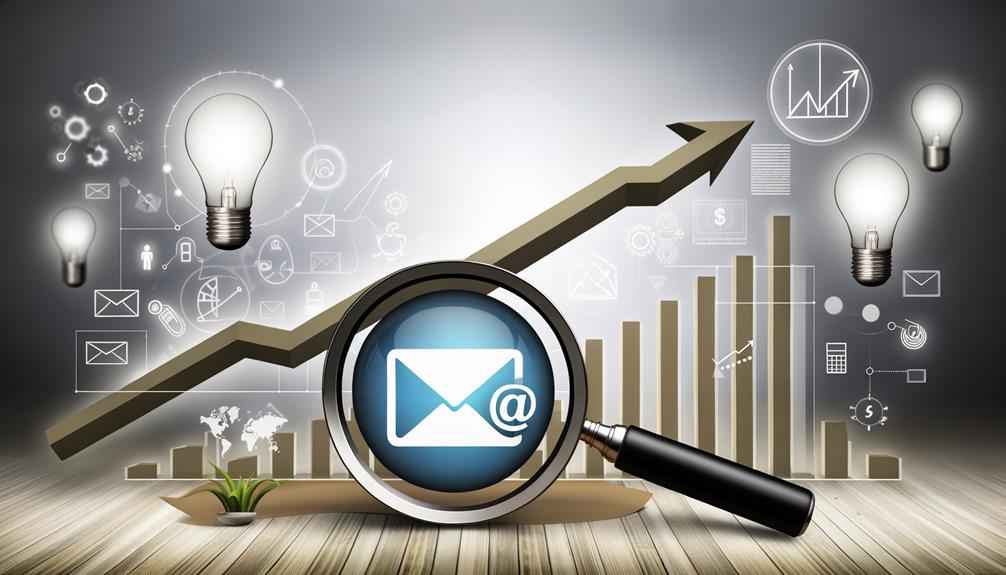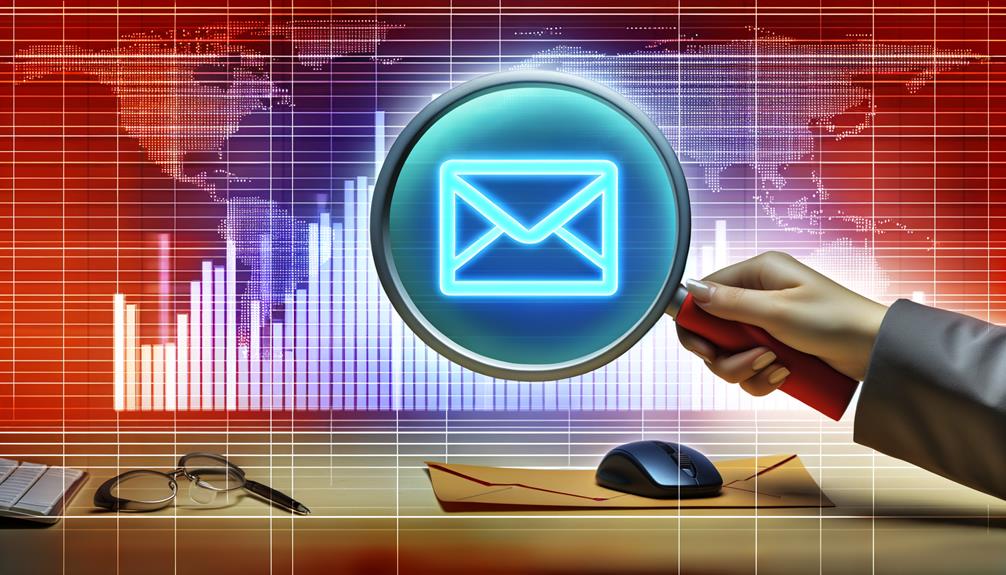
Savvy marketers know, successful selling starts with strategic systems. You might wonder why certain email marketing strategies outperform others for businesses. It's more than just shooting off sales pitches into the digital abyss. The right approach has the potential to boost your brand, build customer loyalty and increase your bottom line. But what makes some strategies more effective than others? How does one leverage the power of email to optimize marketing outcomes? Let's explore these questions together to discover the secrets behind effective email marketing.
Key Takeaways
- Effective email marketing strategies build strong customer relationships and drive conversions, increasing brand recognition and ROI.
- Personalized content and strategic list segmentation increase email relevance, thus boosting engagement and customer loyalty.
- Optimal email frequency and timing, determined by data analysis and testing, enhance audience receptivity and engagement.
- Continuous data analysis and campaign refinement using feedback and performance metrics lead to improved effectiveness and long-term customer relationships.
Understanding Email Marketing Importance

In the realm of digital marketing, understanding the importance of email marketing is vital for any business looking to establish a strong online presence and engage with their customers on a personal level. It's not just about sending out mass emails, it's more about crafting targeted, personalized messages that resonate with your audience.
To get a clear view of the significance, let's conduct an importance evaluation. Email marketing, if done correctly, can help you build strong relationships with your customers, enhance brand recognition, and ultimately drive conversions. It's a cost-effective tool that allows you to reach a large audience while giving you the opportunity to segment and tailor your message for different groups of customers. It's direct, personal, and it puts you right in your customer's inbox, a place they check daily.
Benefits analysis further emphasizes why it's crucial. Email marketing has an impressive ROI, with every $1 spent, the average return is $42. It isn't just about sales; it's also about nurturing relationships. Email marketing allows you to provide valuable content to your customers, making them feel valued and appreciated. This, in turn, fosters brand loyalty, making your customers more likely to choose you over your competitors.
Innovation is key in email marketing. You can't afford to be stale or predictable. Your audience craves fresh, relevant content. The use of automation, personalization, and data analysis can help you deliver just that.
In short, understanding the importance of email marketing is not a luxury, it's a necessity. It's a powerful tool that can help you achieve your business goals if you use it right.
Building a Targeted Email List
To take full advantage of email marketing's potential, you'll need to start by building a targeted email list, laser-focused on customers who are genuinely interested in your products or services. But how do you build this targeted list? And how does it contribute to effective email marketing?
- Start with Your Existing Customers: Your current customers are your best source for building an initial email list. They've already shown interest in your products and are more likely to engage with your emails.
- Use List Segmentation: Not all your customers have the same needs or interests. By segmenting your email list based on customer behavior, purchase history, or demographic data, you can ensure your emails are relevant to each recipient. This increases the chances of your emails being opened and read.
- Personalize Your Outreach: A personalized email stands out in a crowded inbox. It shows the recipient that you value them as an individual, not just as a potential sale. This can increase engagement and build stronger relationships with your customers.
- Offer Value in Exchange for Email Addresses: To attract new subscribers, offer something of value in return for their email address. This could be a discount, a free ebook, or exclusive access to new products.
Crafting Compelling Email Content

Once you've built your targeted email list, it's essential that you craft compelling content that grabs your audience's attention and persuades them to take action. The effectiveness of your email marketing depends largely on the quality and relevance of your content. Let's look deeper into two crucial aspects: 'Subject line significance' and 'Personalization tactics'.
The subject line is the first thing your audience sees and its significance can't be overstated. A compelling subject line is like a movie trailer—it gives a sneak peek into your email's content, sparking curiosity and encouraging the recipient to open the email. It's important to keep it concise, engaging, and relevant to the content. Also, consider using power words or action verbs for a greater impact.
Now, onto personalization tactics. Personalization goes beyond simply inserting the recipient's name into the email. It's about understanding your audience's preferences, behavior, and needs, then tailoring your content to match these insights. Remember, people appreciate being recognized as individuals, not just another email address. Therefore, segment your list based on various factors such as location, purchase history or engagement levels, and customize your content for each segment.
Crafting compelling content is a mix of art and science. It's about striking a balance between creativity and data-driven decisions. So, keep testing different approaches, analyze the results, and continually refine your strategy. With the right content, you'll not only attract your audience's attention but also persuade them to engage with your business.
Frequency and Timing of Emails
Navigating the intricacies of email frequency and timing can significantly influence your campaign's success, as striking the right balance is key to maintaining your audience's interest without overwhelming them. The concept of 'Optimal Sending Times' and understanding 'Audience Engagement Patterns' can help you fine-tune your email strategy.
Here are four key factors to consider:
- Understanding Audience Engagement Patterns: Recognizing when your audience is most likely to engage with your emails is crucial. Utilize data analytics to identify peak times when your audience is online and receptive.
- Determining Optimal Sending Times: Once you've identified your audience's habits, choose the optimal times to dispatch your emails. This might be during the morning commute, lunch hour, or evening downtime.
- Striking a Balance with Frequency: It's important to find the right frequency for your emails. Sending too many can overwhelm and annoy your subscribers, leading to higher unsubscribe rates. Conversely, sending too few might cause your brand to be forgotten.
- Experimentation and Iteration: Lastly, don't be afraid to test different timing and frequency strategies. What works best for one audience may not work for another. Always be ready to innovate and adapt.
Monitoring and Adjusting Email Campaigns

As you refine your understanding of your audience's engagement patterns and optimize your email frequency, it's equally critical to closely monitor your campaigns and make necessary adjustments. This is where Campaign Analytics and Performance Metrics come into play. They provide data-driven insights that can be leveraged to enhance the effectiveness of your strategies.
Consider this – you've crafted a brilliant email, set the perfect timing, but the open rates are lower than expected. Rather than second-guessing your strategy, delve into your Campaign Analytics. They offer a comprehensive view of how your emails are performing in real time. You'll be able to track metrics such as open rates, click-through rates, and bounce rates, enabling you to identify potential issues and opportunities for improvement.
Performance Metrics, on the other hand, give a broader view of your overall campaign performance. They quantify the success of your efforts, such as the number of new subscribers, the retention rate, and the conversion rate. These metrics provide a clear snapshot of where you're excelling and where you need to adjust your strategies.
But remember, these tools are just the starting point. Once you have this invaluable data, it's essential to act on it. Make necessary adjustments to your email content, design, or frequency, based on the insights gathered. Test different approaches, analyze the results, and continuously refine your strategies. Because, in the dynamic world of email marketing, it's not just about launching campaigns, it's about monitoring, adjusting, and innovating for success.
Frequently Asked Questions
How Can a Company Determine the Return on Investment of Their Email Marketing Strategy?
You can determine the ROI of your email marketing strategy by using ROI calculation methods. First, you'll need to track your email marketing expenses. Then, compare those costs to the revenue generated from your campaigns. You'll see how much you're getting back from what you've invested. This analysis is essential for budgeting and making strategic decisions. Remember, innovation in email marketing can lead to significant business growth.
What Are Some Legal Considerations Businesses Need to Be Aware of in Email Marketing?
You must consider privacy policies and data protection in your email marketing strategies. It's crucial to respect your customers' personal information. Make sure you're not violating any regulations with your marketing efforts. Get consent before sending promotional emails. Keep your subscribers informed about how their data is used. Staying compliant with these legalities not only protects your business but also builds trust among your audience, making your email marketing more effective.
How Can Businesses Integrate Their Email Marketing Strategy With Other Digital Marketing Strategies?
You can integrate your email marketing strategy with other digital strategies by using personalization techniques and multi-channel integration. It's about blending your email efforts with social media, SEO, and content marketing. Personalize your content based on customer data and cross-promote it on various platforms. This approach ensures your message reaches a wider audience, increasing engagement and conversions. It's innovative, effective, and can give your business a competitive edge.
What Are Some Key Metrics to Monitor for Assessing the Success of an Email Marketing Campaign?
To evaluate your email marketing campaign's success, you'll need to monitor key metrics. Focus particularly on segmentation effectiveness – are your targeted emails reaching the right audience segments? Also, measure personalization impact – how does tailoring content to individual preferences influence customer engagement? You'll see, these metrics provide valuable insights into campaign performance, helping you refine tactics for improved results. Remember, it's not just about sending emails, it's about sending the right message to the right person.
How Can Businesses Ensure Their Emails Are Not Marked as Spam or Junk by the Recipients?
To ensure your emails aren't marked as spam, you've got to focus on two key elements: email personalization and sender reputation. Personalizing emails makes your audience feel valued and less likely to report your emails as spam. Maintaining a good sender reputation requires regularly cleaning your email list and respecting opt-outs. By innovating and applying these strategies effectively, you can keep your emails out of the spam folder.
Conclusion
So, you see, email marketing is a game-changer for your business. By building a targeted email list, crafting compelling content, and nailing the timing, you're already on the path to success. But, don't forget to monitor and tweak your campaigns. Remember, it's all about continuous improvement. Be analytical, detail-oriented and persuasive. Your business will thank you for your efforts, and so will your bottom line. Now, get out there and start emailing!
Related Posts

Why Should Small Businesses Personalize Email Marketing?
Skyrocket your small business's engagement rates by personalizing email marketing – discover why it's crucial to cater to your customer's unique needs.
- March 2, 2024

Tailored Email Marketing Tactics for Small Businesses
Boost your small business's success with effective, personalized email marketing strategies; discover how in our comprehensive guide.
- March 1, 2024
👇 Book Your Free Consultation
👇 You May Also Like…
Local Business Heroes 'Go' Platform Replaces Over 20 Other Software
It is everything your small business needs to compete, all in one place so you can convert more customers and grow your business without tech overwhelm.






